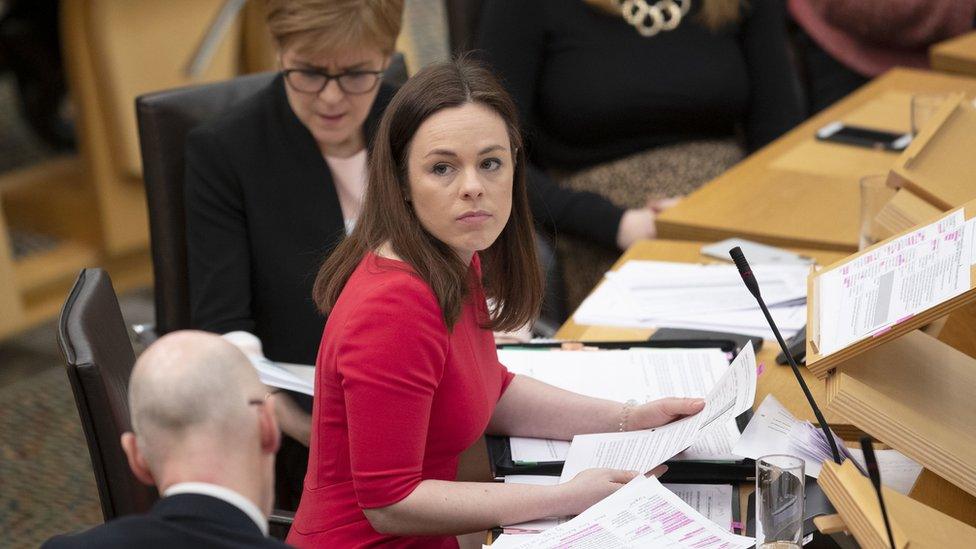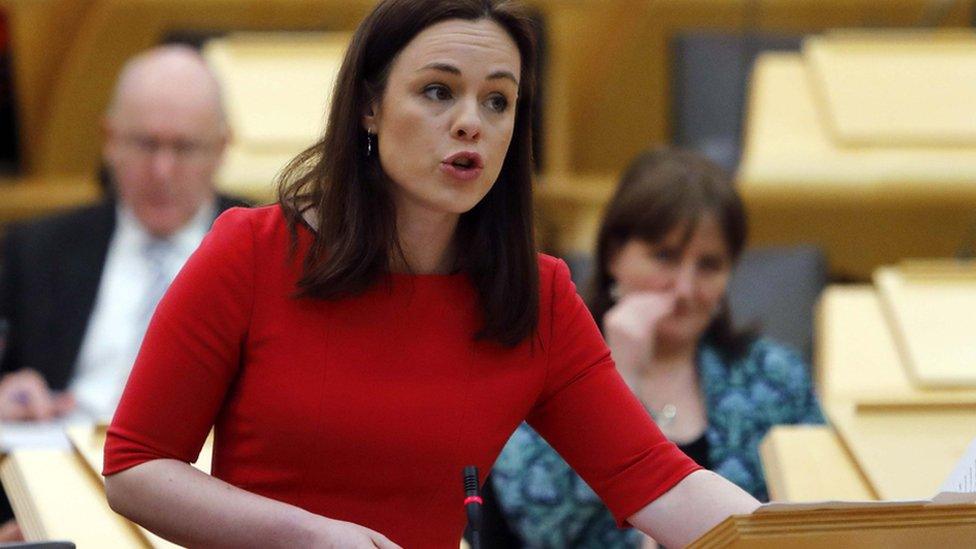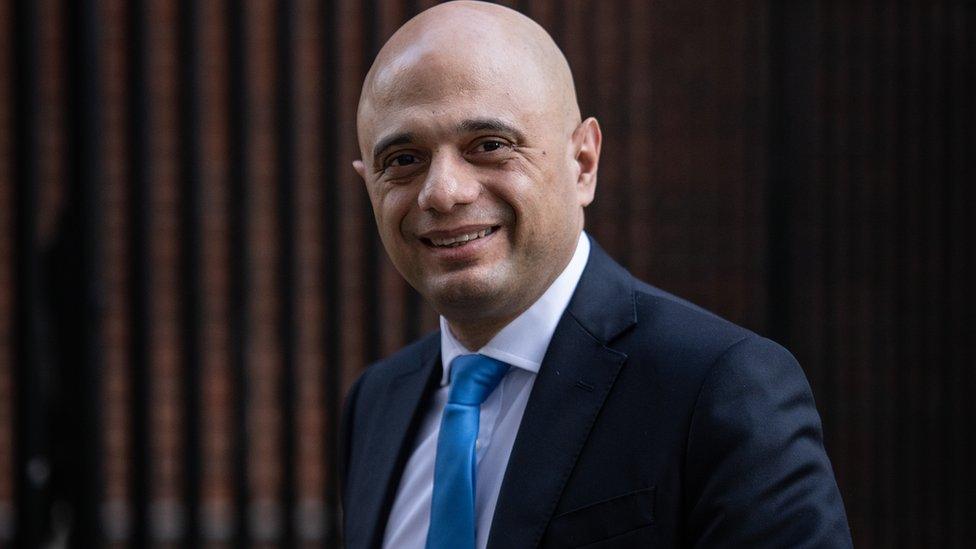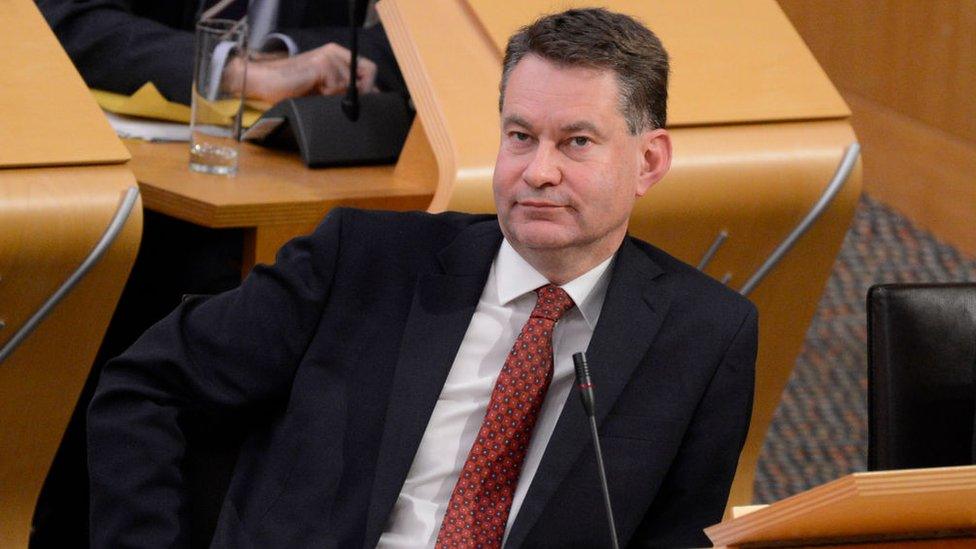Scottish government: No extra cash for budget deals
- Published

Public finance minister Kate Forbes unveiled the Scottish governments spending pledges for the next financial year
The draft Scottish budget has begun its passage through Holyrood, on a tight timetable, and with opposition MSPs putting council spending at the top of their list of concerns.
That requires a budget deal across party lines. Talks are now under way, but acting Treasury Secretary Kate Forbest insists there is no extra money available.
There's growing risk in the budget, as powers are devolved. Scotland's tax watchdog is suggesting ministers should take care not to over-commit any extra funding while they run the risk of unexpected costs.
The sofa of Scottish government budgeting has been thoroughly rifled. All possible hiding places for stashes of cash, for use in a potential budget deal with opposition MSPs, have been cleaned out.
There's nothing stuffed down the back, insists stand-in finance secretary Kate Forbes. "Every available penny is on the face of the budget." No, this is not like previous years, she tells a sceptical Tory, Murdo Fraser.
So if opposition parties have more for councils at the top of their list of demands, the stand-in finance secretary says they're going to have to say where it comes from.
This was the public message to Holyrood's finance and constitution committee, ahead of private meetings with representatives of Conservatives, Greens, Liberal Democrats and the Convention of Scottish Local Authorities. Labour's team is scheduled to meet her next week.
Ms Forbes needs at least one of these parties to support the budget, or to abstain. Otherwise, there are several big problems come April and the start of the financial year.

Public Finance Minister Kate Forbes stepped in to deliver the budget last week
Uncertainty
Wednesday was the day when Kate Forbes' draft budget began its rapid journey through the legislative machine. This is a recess week, but MSPs and the minister turned up to move things along.
They get to the first big vote in the final week of this month, and the stage three clincher is on March 5. The law has to be signed off before councils can set their budgets and council tax levels.
That final vote, as you'll probably recall, is six days before Sajid Javid stands up at the Commons despatch box, with a budget which will tell the Scottish Parliament how big its block grant will be. Ahead of then, there's more uncertainty than usual about the numbers.
If there is more money from the Chancellor, then it can't be added to the Scottish budget bill. It may have to be added mid-year.

There is just over a month until Chancellor Sajid Javid delivers his first Budget
"Obscene"
It was with local authorities that MSPs began their scrutiny of the budget. More than half a billion pounds of extra funding is being handed to councils, but it's all earmarked; for Scottish government childcare policy, for the national deal on teachers' pay, and for pensions. For everything else, there's less money available.
Murdo Fraser pointed to more than 3% extra funding for day-to-day spending on public services, but a real terms cut for councils, asking: is that fair? Labour's Neil Bibby said the council allocation is "obscene".

Murdo Fraser set out the Scottish Conservatives terms for supporting the draft budget
The Greens' Patrick Harvie had the direst of warnings: "I'm sure I'm not the only person around this table who has been told by local government colleagues that the kind of choices they and their colleagues are going to be faced with in the coming weeks will result in substantial reductions in core services - teacher numbers, additional support for learning, social care.
"They have serious concerns that councils will be in breach of their legal duties as a result of choices that they will be forced to make."
The minister responded that councils, unlike others dependent on Holyrood funding, have the flexibility to raise funds from council tax, up to 3% in real terms.
She pointed to other sources of funding that help councils do what they do; city deals, for instance, and housing funds.
Under sustained questions, the minister turned to a familiar narrative. She is "still dealing with a decade of austerity". It's not over - not, at least, if so much of the uplift in budget is committed to health and social care.
Concessions
Climate change spending is going up, conceded Patrick Harvie, but that's after two years of going down. And could the minister point to spending choices that reduced the carbon footprint, rather than pouring concrete and asphalt into making life easier for motorists?
The cars on those improved roads should be increasingly electric by the end of this decade, responded Ms Forbes.
Is there anything to lower the cost of bus travel, asked Mr Harvie? Had the minister, for instance, considered making bus fares free for people aged under 25?
One could see the direction of low-carbon travel to this line of questioning. Greens and Labour are arguing for that policy, and may wish to get political concessions, as well as the ticketed variety, as the price of a budget deal.
With the kitty empty, there's nothing like enough money or time to implement it in 2020-21, but with a pledge to look into it, that could be a handy giveaway a year from now, ahead of the May 2021 Holyrood election.
Maxed out
Before Kate Forbes made her appearance, the Scottish Fiscal Commission was taking MSPs' questions. The official adviser on the assumptions ministers make on tax, it published its report last Thursday alongside the budget.
That made clear that there's growing risk in the Scottish budget, as it takes on a bigger range of devolved powers.
The risk of under-shooting the forecast revenue for income tax is one such risk. Having done so in 2017-18, the first year with the new income tax powers, revenue came in £204m short. That is withheld from the Treasury block grant for 2020-21, and Kate Forbes plans to borrow that amount to plug the gap.
But next year, the shortfall on forecast income tax revenue comes in at £555m. Borrowing to plug that gap is maxing out Holyrood's credit limit.
As the Fiscal Commissioners pointed out, this has effectively been a loan from three years ago. So, they asked, is it really wise to finance the loan when it falls due by taking out another loan?
Splurging
The new risk this year is that the social security benefits may add up faster than forecast. In addition to around £300m of welfare budget in the year now ending, £3bn of spending through the Department of Work and Pensions is also being devolved.
A small portion of it will go into a new benefit, for children in low income families. But most of it is to fund disability living and attendance allowances.
Government has to pay that money out if people meet the criteria for receiving it. That number can change, and from April onwards, Holyrood takes on the risk that it goes over budget.
Until now, Westminster has met such unexpectedly high welfare bills with its flexibility in borrowing. But Holyrood has more constrained borrowing powers. So before he quit in disgrace, former finance secretary Derek Mackay wrote to the Treasury in London, asking for additional borrowing powers to smooth this volatility.
The Treasury answer, Kate Forbes told MSPs: let us know when it becomes a problem.
And remember: eventually, we could see an overshoot of forecasts for income tax revenue or benefits, leaving more money for distribution elsewhere.
Meantime, the Scottish Fiscal Commission says the Scottish government should not simply rely on borrowing to bail it out of trouble. As Holyrood faces more financial risk, Ms Forbes is being warned not to rush into splurging every penny of extra cash that comes from Mr Javid. Even if it's a year out from an election, caution is advised.
